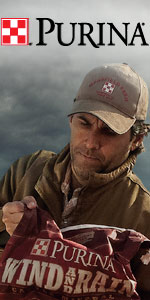Producers Told to 'Heed the Power of Today's Instantaneous Communications'
BOZEMAN, MONT. (Sept. 15, 2010) — The growing influence of social media is something beef producers “can’t afford to ignore,” said Charlie Powell, as he addressed the more than 600 Angus producers attending the National Angus Conference Sept. 15 in Bozeman, Mont. Powell has a 20-year career as the senior public information officer for Washington State University’s College of Veterinary Medicine. His specialties are crisis and risk communications, as well as media relations and institutional promotion.
 Charlie PowellPowell said communication formats such as blogs, cell phones, RSS feeds, Twitter, Facebook and streaming video like YouTube can no longer be considered “social media.” Instead, Powell said, these platforms have become “essential business communication.”
Charlie PowellPowell said communication formats such as blogs, cell phones, RSS feeds, Twitter, Facebook and streaming video like YouTube can no longer be considered “social media.” Instead, Powell said, these platforms have become “essential business communication.”
Why are these social media outlets so powerful? They allow direct peer-to-peer communication that is limitless, inexpensive and available 24 hours a day, seven days a week, 365 days a year, Powell explained. “Seventy-eight percent of consumers trust peer recommendations.”
As a testament to the size and power of these communication formats, Powell relayed the statistic that if Facebook were a country, it today would be the third largest in the world, behind only China and India. “So there is huge information potential there,” Powell said, noting that it can render industries like beef quite vulnerable.
“You need to understand that any information that can negatively impact your market can move instantaneously," Powell explained to cattle producers in the audience. "Anyone today with access to electricity and the Internet can potentially impact your business faster than any news organization in history.”
And, unfortunately, there are few if any checks or balances in place on any aspect of these communications, he added.
Powell’s advice to beef producers was to acknowledge this new instantaneous world of media and be prepared. “The media business is your business. Get over it," he said. "There is no media chain anymore in a crisis. Expect them (the public) to be there before resource officials in a crisis response.”
He suggested the beef industry must “steward the production of their product” by keeping the public informed about everyday ranching practices. “Talk about your actions," Powell advised. "Preload the public with information such as why we brand, vaccinate or preg-check, etc.” This can help build understanding before a crisis occurs, he pointed out.
Additionally, Powell said producers:
- Should prepare for a crisis to occur — and be broadcast to the world — more quickly than ever before.
- Cannot depend upon regulatory agencies to respond quickly enough. “They are hampered by lack of personnel, budget and sometimes understanding,” Powell said.
- Must anticipate that employees and the public can record every action you take.
- Can expect these actions to appear online.
- Should contract, train and monitor employees, so that proper treatment of animals and handling of a crisis is top of mind.
© Copyright 2010 Angus Productions Inc.
Editor’s Note: This article was written under contract or by staff of Angus Productions Inc. (API), which claims copyright to this article. It may not be published or distributed without the express permission of Angus Productions Inc. To request reprint permission and guidelines, contact Shauna Rose Hermel, editor, at 816-383-5270.


